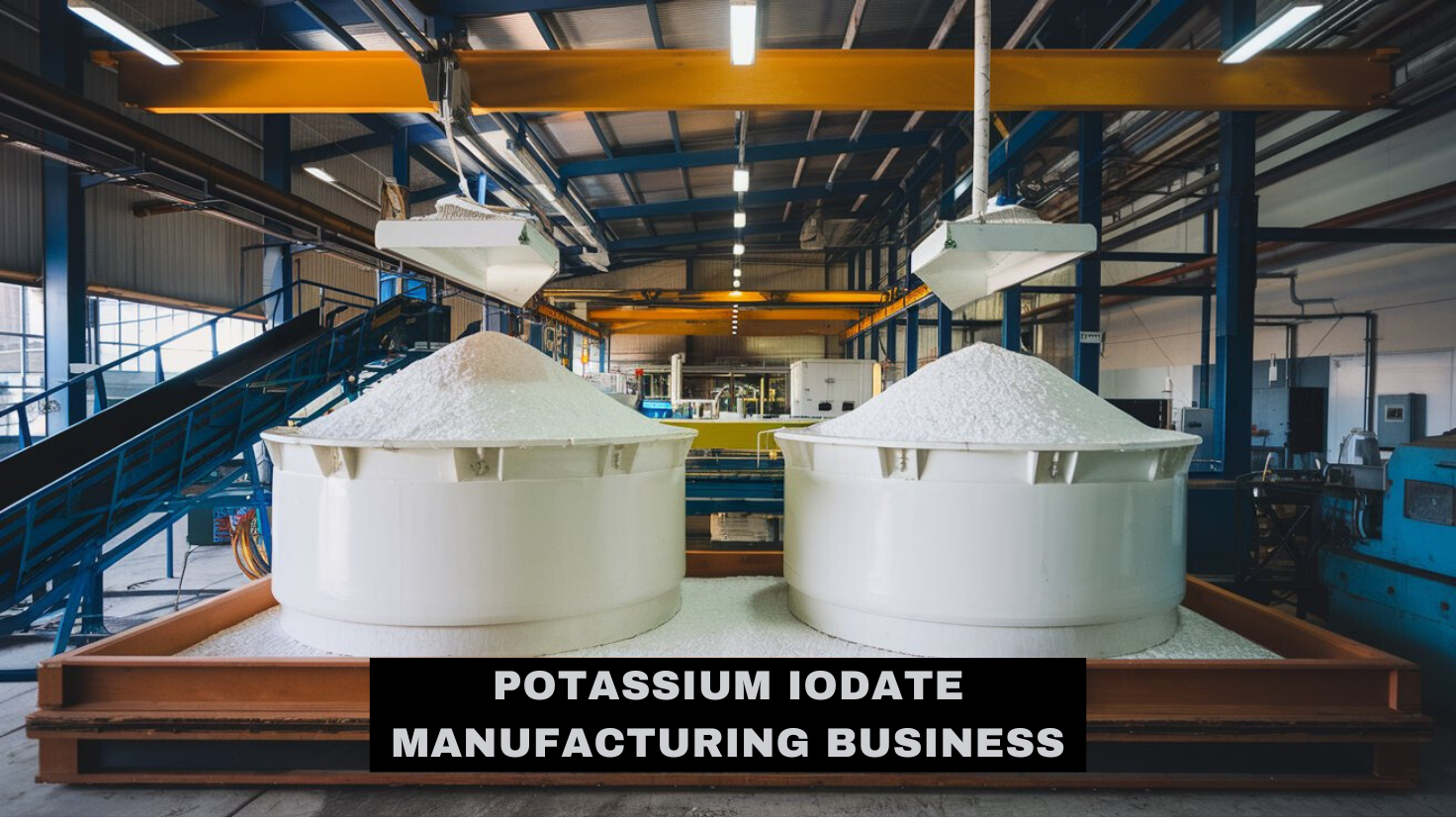In food fortification and in medicine, potassium iodate is a useful compound which has a huge market demand hence the need to classify it as an important compound. The following are some of the opportunities that the interested entrepreneurs in this business can take advantage of; Increased demand for iodine enriched foods and medical products. This is an article on the uses of Potassium Iodate, its manufacturing process and outline of the steps to take to start Potassium Iodate manufacturing business.
What is Potassium Iodate?
Potassium iodate is a white crystalline powder with the formula KIO₃. A chemical which is used as an important source of iodine. It is mainly utilized as a food ingredient, especially in the iodization of Salt to combat Iodine deficiency diseases.
Why Start a Potassium Iodate Business?
The Potassium Iodate market is destined to grow due to various uses it has and awareness of deficiency of iodine in the world today. Here’s why starting this business can be lucrative:Here’s why starting this business can be lucrative:
- Multiple Applications: It has its applications in food processing and food enrichment, drug and pharmaceuticals, water softening and treatment, and as analytical reagents.
- Growing Health Awareness: This worldwide concern for eradicating iodine deficiency is giving a boost to the consumption of iodine containing foods & fortificants.
- Scalability: The manufacturing process allows us to produce small amounts of product and increase production as the number of customers grows.
- Global Market: Potassium Iodate is used globally and that presents a great market growth potential.
- Low Competition: At the same time, ambitious entrepreneurs can still capture a rather large segment because the market share is quite limited.
Benefits of Starting a Potassium Iodate Business
Starting a business in Potassium Iodate manufacturing comes with several advantages:
- High Demand: Deficiency in iodine is prevalent across the world and hence the iodine enriched products are essential in many places.
- Diverse Industry Uses: The use of potassium iodate extends into the Food industry, health and water purification industries which give it a big market base.
- Sustainable Growth: The increasing healthy-betterment consumers guarantees the market demands for fortified foods and health supplements in the long-run.
- Export Potential: Those countries having iodine deficiency programmes they always require iodized salt the supplements this gives the export market.
Key Applications of Potassium Iodate
Food Industry
- Salt Fortification: Potassium iodate is the most common used in salt iodization programs to combat the iodine deficiency.
- Food Additive: It has a role utilized as a stabilizing agent and a preservative in different food items.
Pharmaceutical Industry
- Supplements: It prepares iodine supplements, which play a crucial role in enabling the thyroid gland to work effectively and enhancing health.
- Radiation Protection: Tablets of potassium iodate are taken in order to shield the thyroid gland from taking in radiations.
Water Treatment
- Water Purification: In emergency situations potassium iodate can be applied for the disinfection of drinking water.
Analytical Chemistry
- Reagents: In chemical analysis, testing, and research, it has use because of its role as an oxidizing agent.
Production Methods for Potassium Iodate
You have to base the preparation of Potassium Iodate on chemical reactions and specific conditions in order to yield the best product. The main steps include:
- Raw Material Preparation: You should identify potassium hydroxide (KOH) and iodine as the major reactants in this scheme.
- Reaction Process: In this reaction, you react potassium hydroxide with iodine under carefully controlled conditions to form potassium iodate and potassium iodide.
- Purification: The final solution that is obtained is then purified by filtering to rid of impurities as well as excess iodine.
- Crystallization: The purified solution is cooled and crystallized so as to get potassium iodate in the solid state.
- Drying: The crystals are then dehydrated thus giving the product the necessary stability.
- Milling: For this process, the dried crystals are passed through a milling process so that they are of the right size.
- Quality Control: Each product undergoes rigorous testing in order to give it the best quality that is obtainable in the market.
- Packaging: The company then packages the final product according to the customer’s specifications for transport and storage.
Essential Machinery for Potassium Iodate Manufacturing
This section talks about necessary machinery in the manufacturing unit of potassium iodate. Below is a list of commonly used pieces of equipment:
- Reactors: these promote chemical reaction between potassium hydroxide and iodine to yield potassium iodate.
- Filters: These help to purify the liquid and remove impurities found in products.
- Crystallizers: These are devices that enable solid potassium iodate crystals to be formed from purified solutions.
- Dryers: They drive away the moisture content present in potassium iodate crystals, thus making the end product more stable.
- Milling Machines: Used for shaving off dried pieces into desired fine particles
- Packaging Machines: Necessary packages which keep goods intact while stored or transported.
Starting Your Potassium Iodate Manufacturing Business
- Market Research: Compile research information for demand on potassium iodate in the specific target regions and industries.
- Business Plan: A good example of a contingency plan is to write down a clear business plan. That focuses on the production targets, marketing plan, and estimated budget within the shortest period.
- Regulatory Compliance: Budget for the Special Considerations. This relates to; Comply with local and international legal requirements especially in food and pharmaceutical sectors.
- Infrastructure and Equipment: Ensure the placement of reactors, filters, crystallizers, dryers, and packaging. Ensure the placement of reactors, filters, crystallizers, dryers, and packaging machines.
- Raw Material Sourcing: Ensure the procurement of adequate supply of potassium hydroxide and iodine. Other materials used in the manufacture of the product.
- Quality Control: Ensure quality control measures are put in place in a bid to sustain the quality of the products.
- Marketing and Sales: Advertise your product to food manufacturers, drug manufacturers and other government departments which deal with iodine deficiencies in the society.
- R&D Investments: Sustainability of research to enhance current and discover new applications of the product.
Conclusion
Opportunities that can be seen when starting a business of Potassium Iodate. There are several opportunities when starting a Potassium Iodate manufacturing business since the market is growing. If people recognize the potentials of its versatile applications, they follow good production techniques. If you give priority to quality, you can create a worthwhile and profitable business. With the increase in the market share of iodine rich food products. Your potassium iodate business is in a good position to expand its market returns. This gives the competitive325 edge to embrace innovation. Market trends thus setting the pace to capture the niche specialized market.
Some More Links
Join With Us
https://www.entrepreneurindia.co/
Related Blogs
https://www.niir.org/blog/starting-own-electrolytic-manganese-dioxide-emd-manufacturing-venture/
https://www.niir.org/blog/from-idea-to-reality-starting-own-sodium-benzoate-production/
Join us on YouTube
https://www.youtube.com/c/NIIRproject/playlists






